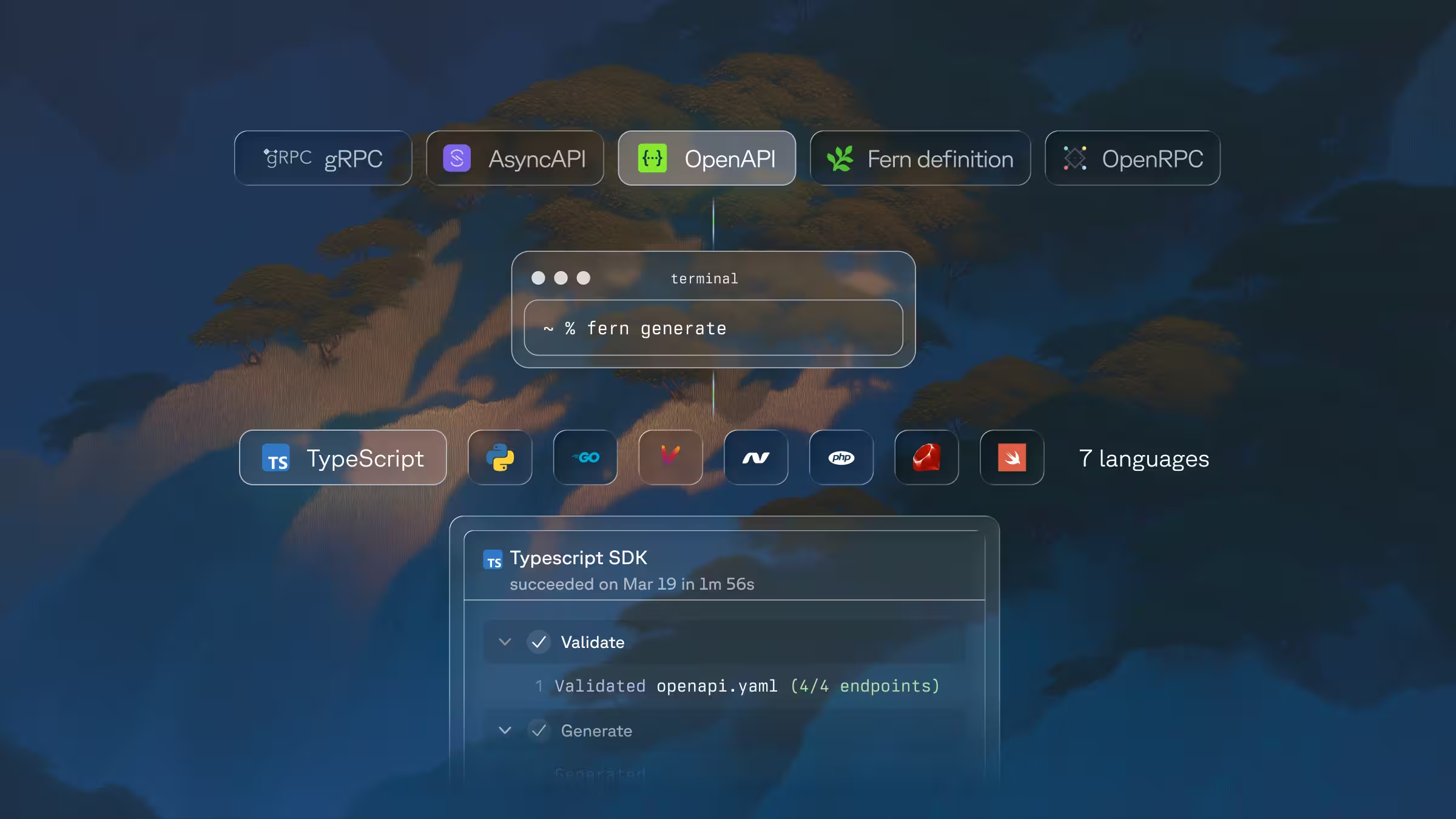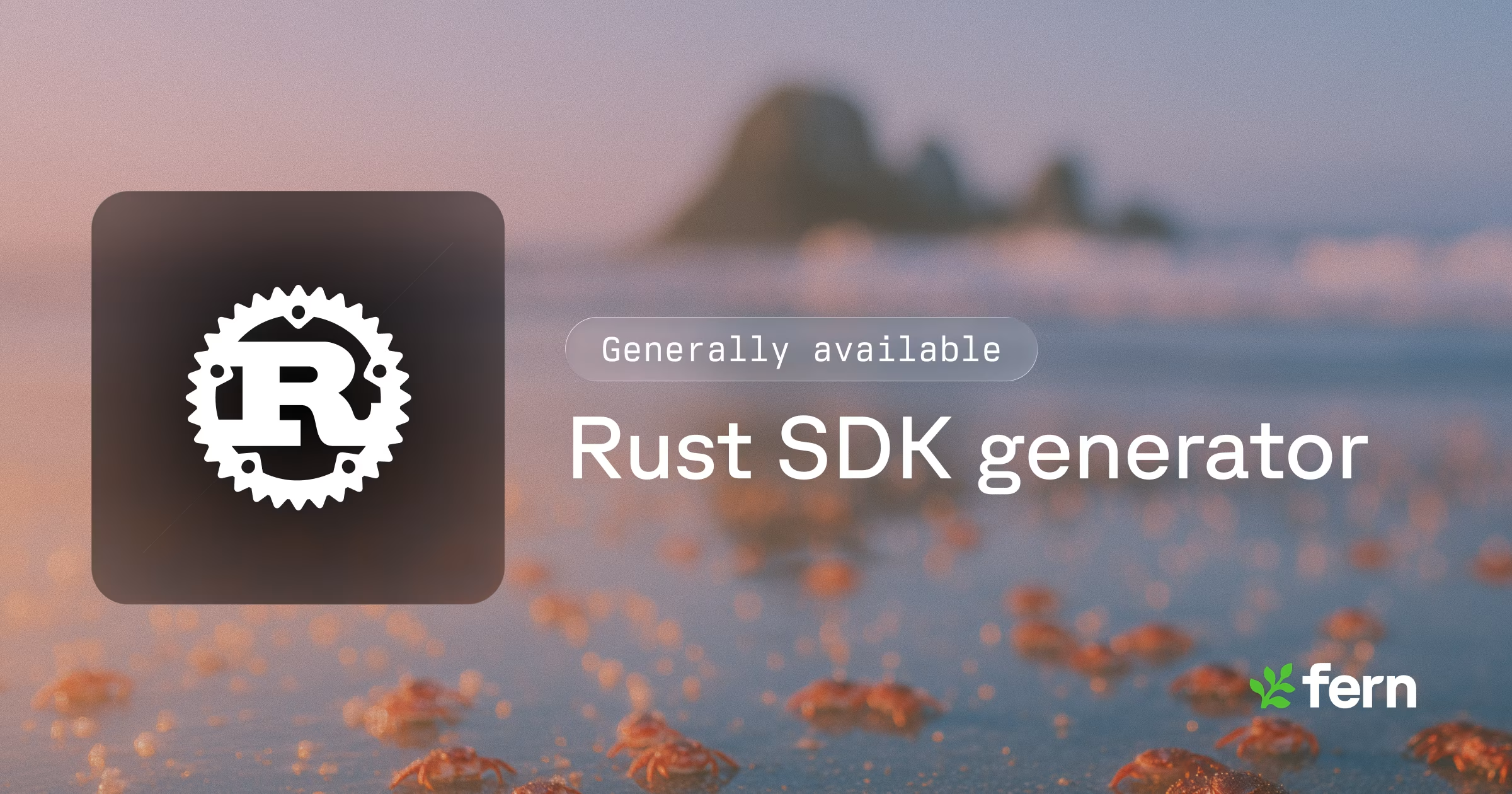When shipping APIs to developers, you need client libraries in the languages they actually use. Most teams hit the same wall: the API is ready, but generating SDKs for multiple languages—while maintaining consistent standards and quality—means months of manual work. Developers can either spend those months writing and maintaining SDKs by hand, or use code generation tools to do the heavy lifting. Here's a look at the best SDK generation tools and what they offer.
TLDR:
- SDK generators automate client library creation from API specs, saving hundreds of engineering hours
- Top tools generate type-safe, idiomatic code across multiple languages with built-in OAuth, retries, and streaming
- OpenAPI Generator offers 50+ languages but requires manual refinement; commercial tools ship production-ready code
- Fern generates SDKs for TypeScript, Python, Go, Java, C#, PHP, Ruby, Swift, and Rust with integrated API reference documentation
What are SDK generation tools?
SDK generation tools are changing how developers approach API integrations. Instead of manually writing HTTP requests, handling authentication, and managing serialization for each language, these tools parse your API definition (OpenAPI, gRPC, or other formats) and generate fully functional client libraries in one or more programming languages.
The quality gap between handwritten and generated SDKs has narrowed considerably. Modern generators produce idiomatic code that follows language-specific conventions, includes SDK code completion (IntelliSense), and handles errors appropriately. The result is type-safe SDKs that feel native to each language while maintaining consistent structure across all of them.
The value proposition is simple: write your API specification once, then generate client libraries for every language your users need. This approach eliminates hundreds of hours of manual SDK development and maintenance, accounting for the approximately 30% of the time developers spend on routine tasks that could be automated. When the API changes, you regenerate the SDKs instead of manually updating code across multiple repositories.
But SDK generators handle more than basic request and response mapping. They include features like automatic retry logic with exponential backoff, built-in pagination helpers, OAuth 2.0 token management, streaming support for real-time data, and file upload handling. These capabilities come bundled in the generated code, so developers integrating your API get a stable and reliable client without writing boilerplate.
What makes a great SDK generation tool?
Seven key factors determine whether an SDK generation tool is production-ready:
- Language coverage: How many programming languages are supported, and how well do the generated SDKs follow each language's conventions and idioms? Code that compiles isn't enough—it needs to feel native.
- Generated code quality: Is the output clean, maintainable, and type-safe? Does it include inline comments? Would you be comfortable shipping it to users without modification?
- Feature completeness: Beyond basic request mapping, does the SDK handle authentication flows, retries, pagination, streaming, and file uploads out of the box?
- Documentation integration: Can the tool generate API reference docs alongside SDKs? Do code examples stay synchronized with your actual client libraries?
- Publishing automation: Does the generator handle versioning and deployment to package registries, or do you need to manually publish updates?
- Developer workflow: How easily does it integrate with CI/CD pipelines and existing development processes?
- Developer experience: How straightforward is setup, and how easy is it to work with the generated artifacts?
Best overall SDK generation tool: Fern
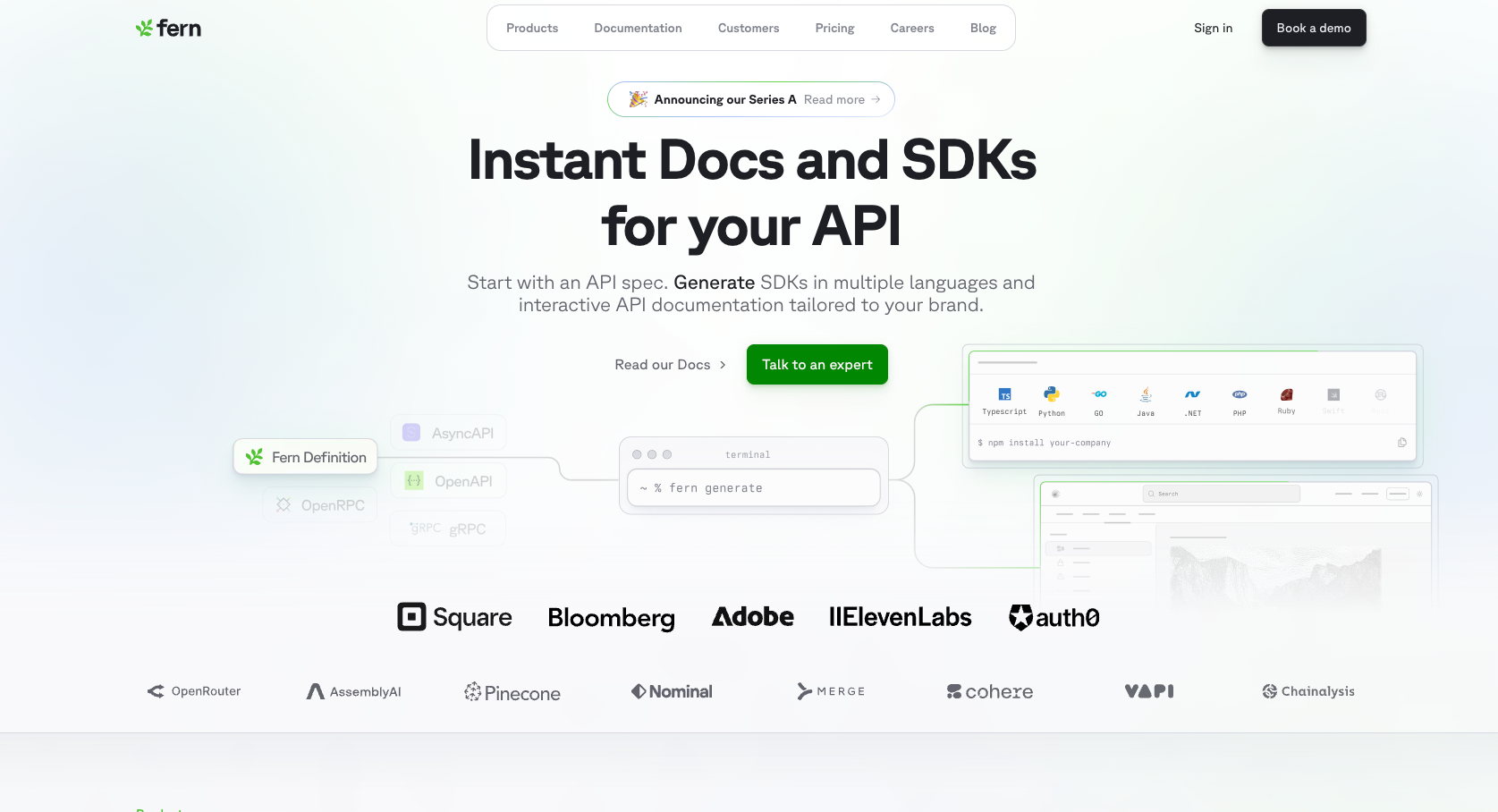
Fern generates SDKs for TypeScript, Python, Go, Java, C#, PHP, Ruby, Swift, and Rust from a single API specification. The output is production-ready code that follows each language's conventions, whether that's Python's snake_case naming, TypeScript's promise patterns, or Go's error handling idioms.
The generated SDKs include authentication handling, automatic retries with exponential backoff, pagination helpers, and streaming support for Server-Sent Events and WebSocket connections. File upload functionality works out of the box with proper multipart form data handling.
It all starts by running fern generate in your CI pipeline to produce updated SDKs and API reference documentation from your OpenAPI spec or Fern definition file. Changes to your API flow through to versioned packages published directly to npm, PyPI, Maven Central, NuGet, and other registries.
APIMatic
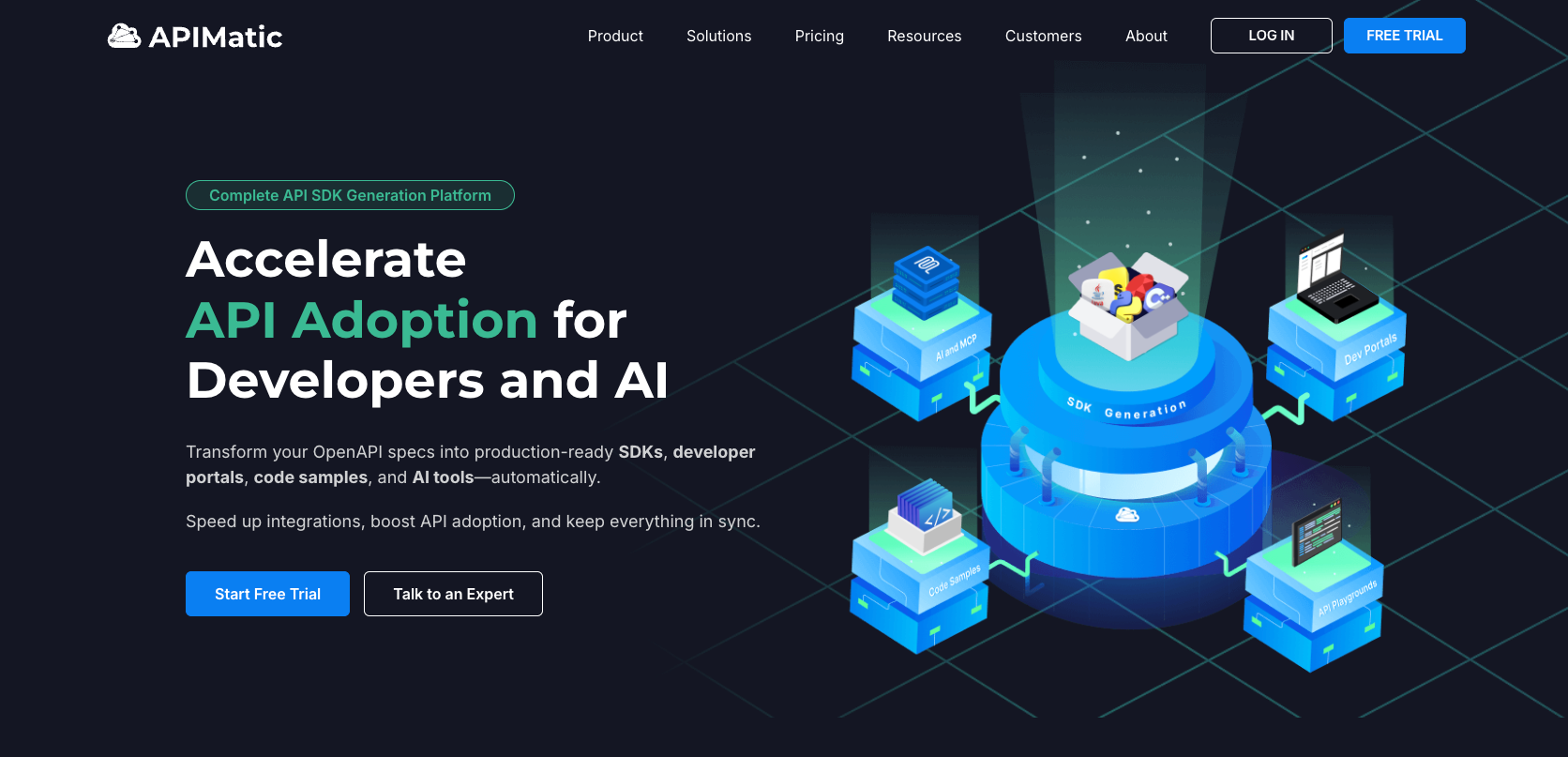
APIMatic entered the SDK generation market early and has built a feature-rich offering over time. The service handles SDK creation across major programming languages while adding developer portal hosting and API transformation capabilities.
Key features
APIMatic includes a number of key features for SDK generation:
- Multi-language SDK generation for TypeScript, Python, Ruby, PHP, C#, Java, and more
- Built-in analytics, API mocking, and developer portal features
- API format transformation between OpenAPI, RAML, API Blueprint, and Postman Collections
- Enterprise deployment options with on-premises solutions available
The downsides
APIMatic uses a download-based approach: the SDKs are downloaded directly instead of integrating into your build pipeline. You can configure it to work with CI/CD using generated configuration files, but this requires additional setup.
The bottom line
APIMatic provides SDK and documentation generation in a single step through a customized portal. The focus on format conversion and portal customization makes APIMatic suitable for teams migrating between specification standards or building bespoke developer hubs.
APIMatic works well for teams that need the full suite of developer portal features and prefer an all-in-one solution. If you primarily need SDK generation with automated CI/CD and publishing workflows, the download-based approach may require more manual orchestration than CLI-first alternatives.
Speakeasy
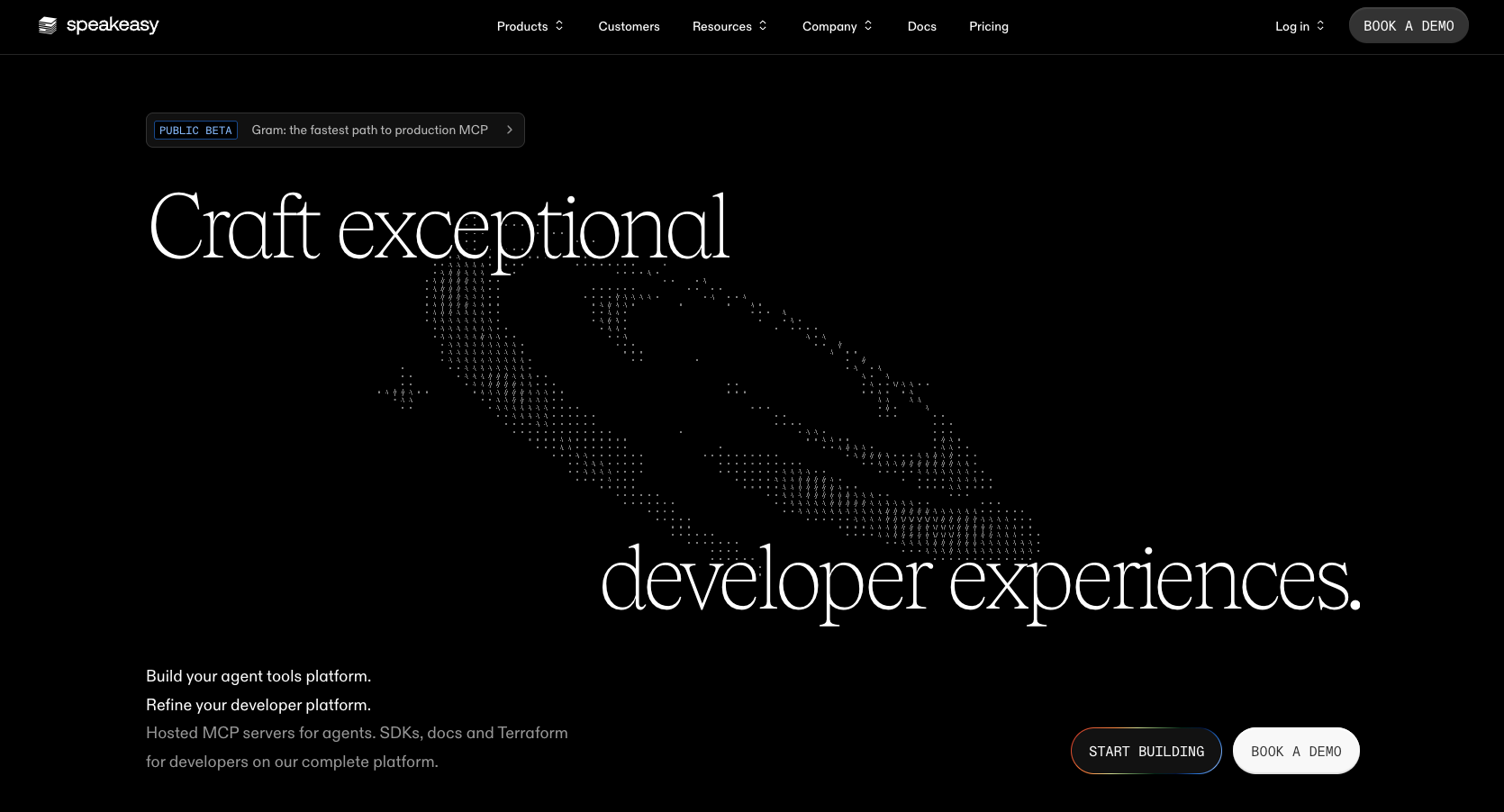
Speakeasy generates SDKs for TypeScript, Python, Go, Java, C#, and PHP. The tool produces type-safe, idiomatic libraries designed for enterprise APIs.
Key features
Speakeasy includes a number of key features for SDK generation:
- Provides SDK Studio (web GUI) for iterating on SDKs and tweaking naming, structure, and behavior
- The SDKs are designed to be powerful yet lightweight, with minimal dependencies
- Multi-language SDK generation with built-in API documentation and usage analytics
- Type-safe code generation that puts developer experience first
The downsides
Speakeasy flattens much of its generated library structure. While simpler to implement, this approach can produce confusion as API surfaces become larger or more deeply nested.
With support for only six SDK languages, Speakeasy may not meet the needs of teams working across mobile, enterprise, or diverse technology stacks.
The bottom line
Speakeasy is a good solution for teams that prefer lean, UI-based tools for SDK generation. While this works for simple use cases, it reduces transparency in the generation process and makes automated pipelines more difficult to maintain at scale.
Stainless

Stainless generates SDKs with a GitHub integration that connects to your repository. The tool creates client libraries across multiple languages and includes usage examples to help developers start making API calls.
Key features
Stainless includes a number of key features for SDK generation:
- Automated SDK generation with minimal configuration
- GitHub workflows that regenerate and publish SDKs when your API changes
- Usage examples included in generated code
- Quick setup from API spec to working SDK
You can go from an OpenAPI specification to usable client libraries faster than most alternatives, which helps when shipping quickly or iterating on API design.
The downsides
Stainless relies heavily on a UI experience for core functionality. You must manually upload your API specification to generate an SDK, then use the UI to tweak, configure, and regenerate it. This workflow can be difficult to integrate into modern, automated development pipelines. Every update to the API spec requires going back to the UI to upload the new file and regenerate.
Stainless does not currently support on-premises generator deployment. For organizations operating under strict compliance, data residency, or governance requirements, greater deployment flexibility is a substantially better fit.
The bottom line
Stainless works well if you need quick SDK generation and don't mind a UI-driven workflow. Teams that prioritize automation and CI/CD integration may find the manual upload process creates friction in their development pipeline.
OpenAPI Generator
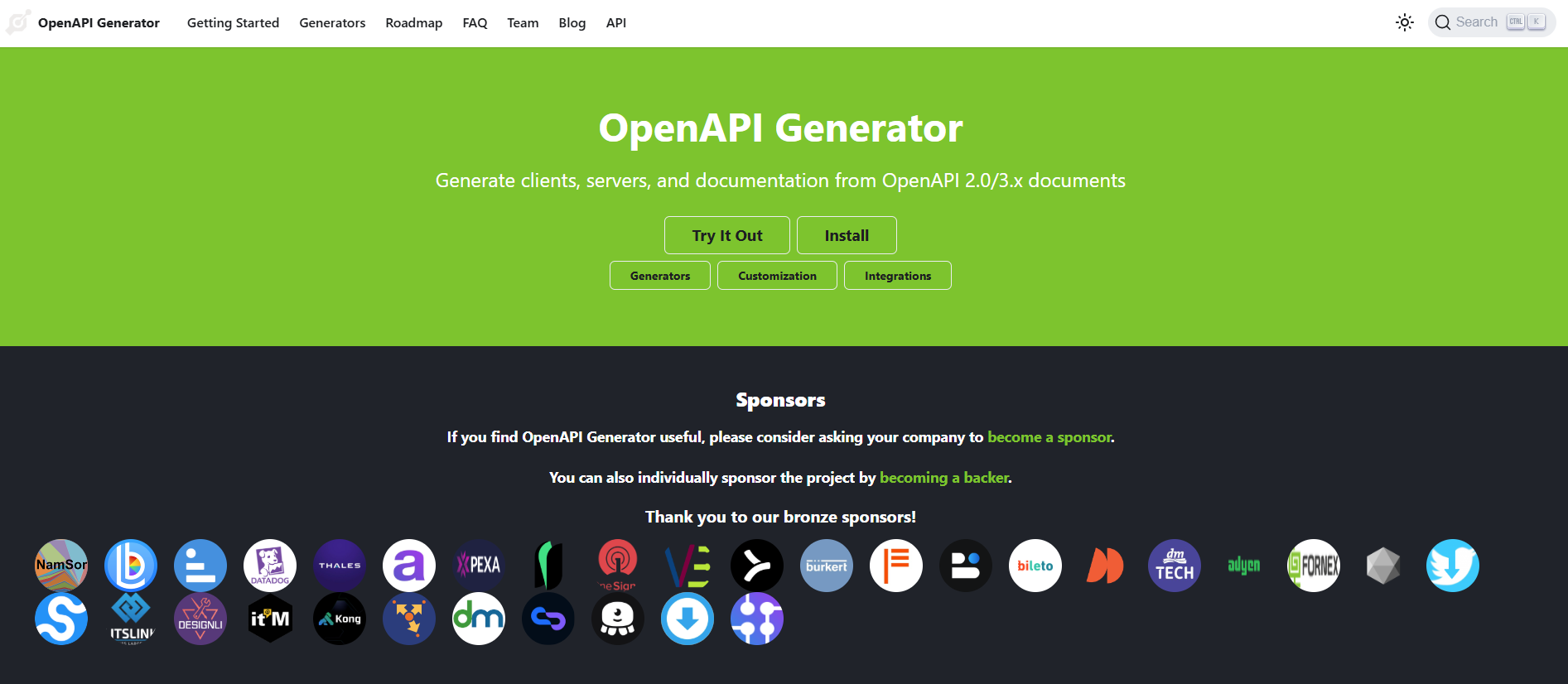
OpenAPI Generator is an open-source fork of Swagger Codegen that supports over 50 programming languages. As a community-driven project with active contributors, it offers the broadest language coverage of any SDK generation tool.
Key features
OpenAPI Generator includes a number of key features for SDK generation:
- SDK generation for 50+ languages including Java, TypeScript, Python, Ruby, PHP, C#, and Go
- Customizable templates that let you modify generated code structure and style
- CLI tool that integrates with CI/CD pipelines for automated regeneration
- No licensing costs with Apache 2.0 open-source license
The downsides
The generated code typically requires manual refinement before production use. Output tends to be generic instead of idiomatic, missing language-specific conventions that make SDKs feel native.
The bottom line
OpenAPI Generator works well when you need basic SDK scaffolding across many languages and have engineering time to refine the output.
Feature comparison table of SDK generation tools
Comparing tools side-by-side reveals significant differences in experience and feature completeness. Language coverage matters, but SDK quality, automated docs, and built-in reliability features determine whether you can ship a complete developer experience or need to piece together multiple tools.
Why Fern is the best SDK generation tool
Fern delivers both high-quality SDKs and well-structured documentation. It solves the common problem where SDK generators produce working but generic code, while documentation tools don't connect to your actual client libraries. Fern's unified approach keeps code examples accurate by generating both from the same specification.
With Fern, generated SDKs include proper error handling, OAuth token management, retry logic, and streaming support without configuration. When you run fern generate, you get libraries that respect TypeScript's async patterns, Python's naming conventions, and Go's interface design. Connect your API spec and choose your target languages: Fern handles versioning, publishing to package registries, and documentation deployment.
Final thoughts on SDK generation tools
Manual SDK development across languages becomes unsustainable as your API grows. Code generation tools give you consistent client libraries with authentication, retries, and pagination built in. You can ship SDKs in nine languages faster than writing one by hand, and updates flow through automatically when your API changes. Fern is the best choice when looking to provide idiomatic SDKs in the languages your customers use and foster a better developer community.
FAQ
How do I integrate SDK generation into my CI/CD pipeline?
Most tools support CLI commands that fit into GitHub Actions, GitLab CI, or Jenkins workflows, with automated publishing to package registries included. When using Fern, run fern generate as part of your build process to automatically create updated SDKs whenever your API specification changes.
What's the difference between OpenAPI Generator and commercial SDK tools?
OpenAPI Generator provides basic code scaffolding across 50+ languages but requires manual refinement for production use. Commercial tools like Fern produce idiomatic, type-safe code with built-in features like OAuth, retries, and pagination that work out of the box.
Can I customize the generated SDK code without losing changes on regeneration?
Yes, modern SDK generators support customization hooks that let you inject utility functions or project-specific logic. These modifications persist across regenerations, so you can extend the generated code while still benefiting from automatic updates when your API evolves.
When should I choose an SDK generator over hand-writing client libraries?
If you're supporting more than two programming languages or spending a lot of engineering time maintaining existing SDKs, generation tools save hundreds of hours. The breakeven point typically comes when manual SDK maintenance exceeds the setup and integration time for automated generation.

